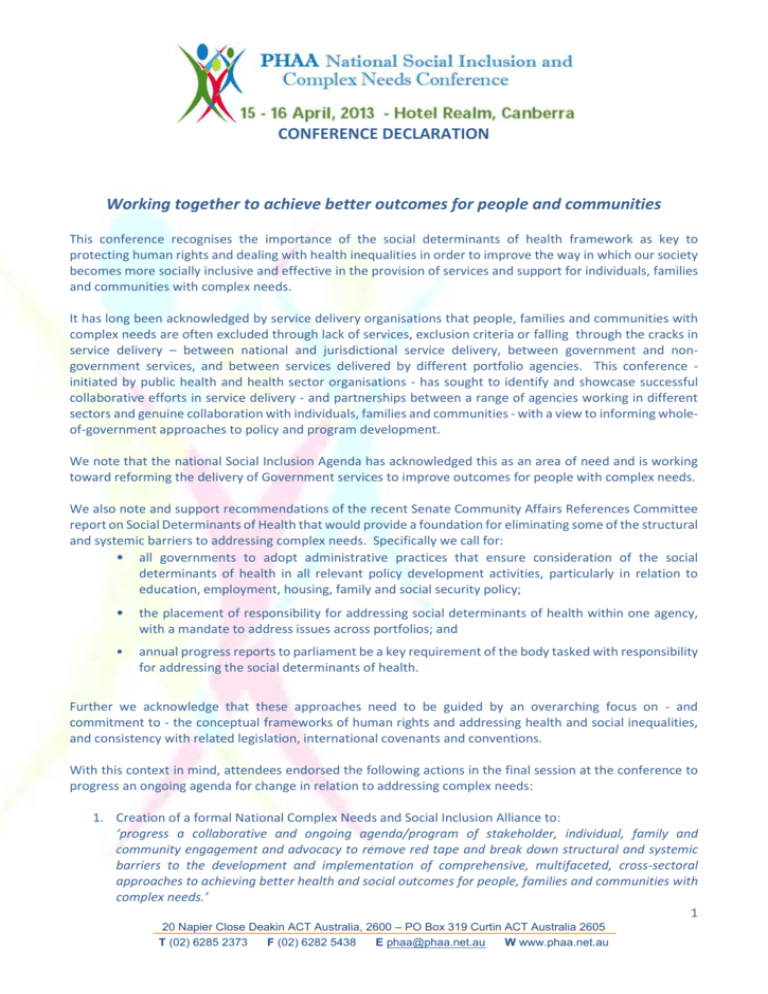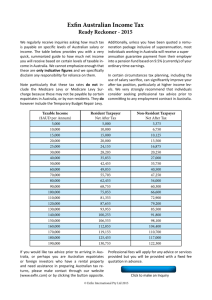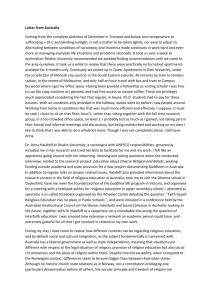National Social Inclusion and Complex Needs Conference
advertisement

CONFERENCE DECLARATION Working together to achieve better outcomes for people and communities This conference recognises the importance of the social determinants of health framework as key to protecting human rights and dealing with health inequalities in order to improve the way in which our society becomes more socially inclusive and effective in the provision of services and support for individuals, families and communities with complex needs. It has long been acknowledged by service delivery organisations that people, families and communities with complex needs are often excluded through lack of services, exclusion criteria or falling through the cracks in service delivery – between national and jurisdictional service delivery, between government and nongovernment services, and between services delivered by different portfolio agencies. This conference initiated by public health and health sector organisations - has sought to identify and showcase successful collaborative efforts in service delivery - and partnerships between a range of agencies working in different sectors and genuine collaboration with individuals, families and communities - with a view to informing wholeof-government approaches to policy and program development. We note that the national Social Inclusion Agenda has acknowledged this as an area of need and is working toward reforming the delivery of Government services to improve outcomes for people with complex needs. We also note and support recommendations of the recent Senate Community Affairs References Committee report on Social Determinants of Health that would provide a foundation for eliminating some of the structural and systemic barriers to addressing complex needs. Specifically we call for: • all governments to adopt administrative practices that ensure consideration of the social determinants of health in all relevant policy development activities, particularly in relation to education, employment, housing, family and social security policy; • the placement of responsibility for addressing social determinants of health within one agency, with a mandate to address issues across portfolios; and • annual progress reports to parliament be a key requirement of the body tasked with responsibility for addressing the social determinants of health. Further we acknowledge that these approaches need to be guided by an overarching focus on - and commitment to - the conceptual frameworks of human rights and addressing health and social inequalities, and consistency with related legislation, international covenants and conventions. With this context in mind, attendees endorsed the following actions in the final session at the conference to progress an ongoing agenda for change in relation to addressing complex needs: 1. Creation of a formal National Complex Needs and Social Inclusion Alliance to: ‘progress a collaborative and ongoing agenda/program of stakeholder, individual, family and community engagement and advocacy to remove red tape and break down structural and systemic barriers to the development and implementation of comprehensive, multifaceted, cross-sectoral approaches to achieving better health and social outcomes for people, families and communities with complex needs.’ 1 20 Napier Close Deakin ACT Australia, 2600 – PO Box 319 Curtin ACT Australia 2605 T (02) 6285 2373 F (02) 6282 5438 E phaa@phaa.net.au W www.phaa.net.au CONFERENCE DECLARATION Organisations with representatives attending the conference will automatically be invited to join the new National Alliance. The organisations listed overleaf were among those with representatives attending the conference. It is envisaged that the Alliance will seek to progress the agenda via a variety of activities, including through engagement with: • Not For Profit (NFP) Reform process and the Not-For-Profit Sector Reform Council; • Department of Human Services Service Delivery Reform agenda; • Australian Social Inclusion Board; • Premiers of each State and Territory; • Local Government leaders/authorities; • Justice Sector; and • Other relevant forums/bodies at the national and jurisdictional levels. A process will be established to enable additional consumers, families, communities, NGOs and government representatives and agencies to join the Alliance. 2. PHAA will hold biennial National Social Inclusion and Complex Needs Conferences to showcase successful and new programs/approaches in addressing social inclusion, complex needs and social determinants of health to assist with progressing the broader agenda of the Alliance. Conference delegates further noted: • The depth and diversity of participants attending the conference – addressing complex needs is a very taxing and critical challenge affecting so many organisations - but more importantly impacting on our communities, with growing needs and demands on services combined with limited and reduced resources. • The impact of recent government funding cuts at the State and Territory level for service delivery by community/health organisations, that will significantly reduce and reshape delivery of treatment and preventative community and health services impacting adversely on levels of current and unmet need. These actions have further diminished the capacity to address complex needs, and cuts to funding at the jurisdictional level will foreseeably have flow on effects for federal funding of grants and programs. Cuts to funding at the jurisdictional level will foreseeably contribute to overloads in other areas of public health which are not equipped, resourced or capable of dealing with people, families and communities with multiple complex personal and health needs. • The complex needs agenda needs to be built into current and future government policy and programs - for instance, as part of the implementation of health reforms, the further development of Medicare Locals and the implementation of the National Disability Insurance Scheme (DisabilityCare Australia). • The importance of the public health tradition of analysis of inequality and scholarship aimed at developing systems that are both efficient and effective in responding to health inequity- through models of care, support, community control and action on determinants. 2 20 Napier Close Deakin ACT Australia, 2600 – PO Box 319 Curtin ACT Australia 2605 T (02) 6285 2373 F (02) 6282 5438 E phaa@phaa.net.au W www.phaa.net.au CONFERENCE DECLARATION • That the implementation of any annual progress reports to parliament on social determinants of health (in line with the Senate Committee recommendations) must be inclusive of performance indicators related to cross-portfolio efforts to address complex needs. • The role of the Australian Social Inclusion Board and the need for the new Alliance to seek to engage with the ongoing work of the Board and related structures. • The opportunity for developing an ‘umbrella coordination’ role/function to facilitate the implementation of person-centred, ‘wrap around’ approaches to case management. • The need for a multi-disciplinary approach to address the complex relationships between legal issues and health. • That national action on complex needs requires a process of evolution in relation to existing initiatives/programs. There are many examples of practical linkages that could assist those with complex needs to navigate the maze of available interventions - for instance, linking health, education and justice interventions for those who are homeless, people with Fetal Alcohol Spectrum Disorder or people with acquired brain injury. There are some established models of best practice in working with sub-sets of the complex needs population but these are currently ad hoc with little supporting structure at the policy or funding level. • These existing best practice examples should be formally evaluated to inform broader uptake mapping out what exceptional front line services do to inform the development of cross-portfolio policy and strategy in relation to respective roles and contributions. That the concept of ‘complex needs’ goes far beyond just mental health and alcohol and other drug problems to encompass a far broader scope of social determinants of health and disability. • The idea that while the ‘no wrong door’ concept is sound, it is often difficult for people, families and communities with complex needs to find any door at all in terms of accessing service delivery agencies/organisations. • That an ongoing agenda/program of engagement and advocacy is required to break down structural and systemic barriers to the development and implementation of comprehensive, multifaceted, cross-sectoral approaches to achieving better health and social outcomes for people, families and communities with complex needs. • That engagement and advocacy efforts should also be underpinned by a commitment to the following values, attitudes and principles: o Respect for each other, in terms of appropriate engagement with individuals and communities; o Cultural safety; o Valuing lived experience – providing opportunities for consumer and carer voices to be heard and supporting community-driven responses. It is important that policy and program development in relation to community services is focused on and reflects client and community needs; o Acknowledging the importance of cross-sectoral workforce capacity development; and o Regard for the specific needs of young people, youth and children. 3 20 Napier Close Deakin ACT Australia, 2600 – PO Box 319 Curtin ACT Australia 2605 T (02) 6285 2373 F (02) 6282 5438 E phaa@phaa.net.au W www.phaa.net.au CONFERENCE DECLARATION List of organisations with representatives attending the conference: ACT Corrective Services ACT Government ACT Health Directorate ACT Hepatitis Resource Centre Inc. ACT Medicare Local ADIS, Alcohol & Drug Service, Inner City Adults Surviving Child Abuse Australian Federation of AIDS Organisations Ageing, Disability and Homecare A Gender Agenda AIDS Action Council ACT Alcohol & Drug Service, Inner City Health Alcohol and Other Drugs Council of Australia Alliance For Forgotten Australians Anunipima Cape York Health Centre Attorney-General's Department Australia Post Australian Bureau Of Statistics Australian Catholic University Australian Federal Police Australian Injecting & Illicit Drug Users League Australian Institute For Primary Care Australian Institute Of Family Studies Australian Institute Of Health And Welfare Australian National Council On Drugs Australian National Preventive Health Agency Australian Red Cross Baker IDI BakerIDI Diabetes And Heart Institute Barwon Health MHDAS Bayside Medicare Local Bridges Aligned Services Calvary Health Care ACT Camperdown Child And Family Health Camperdown Clinic Canberra Sexual Health Centre Cancer Council NSW Care Connect Carers Australia CatholicCare Catholic Health Australia Centacare Tasmania Central Institute Of Technology Central Queensland Medicare Local Central Victorian Health Alliance Centre For Oral Health Strategy Centre For Research and Action In Population Children By Choice Childrens Protection Society City Of Melbourne Combined Universities Centre For Rural Community Restorative Centre Country Health SA Country North SA Medicare Local DCSI - Exceptional Needs Unit Deakin University Department Of Health Department of Health and Ageing Dietitians Association Of Australia Directions Disability ACT Disability Services Commission Doutta Galla Community Health Drug And Alcohol Multicultural Education Faces In The Street, St Vincent's Health Urban Faculty Of Health University Of Technology Faculty Of Law, University Of Wollongong Families & Friends For Drug Law Reform Families Australia Flinders University Flinders University Rural Clinical School Goldbridge Rehabilitation Services Health Improvement Branch Health Promotion/ Food Security Healthwest Partnership Hepatitis Australia Hepatitis Council Of Queensland Hepatitis Queensland HIV Outreach Team- South Eastern Sydney HomeGround Services Horizon Foundation Housing ACT Hunter New England Local Health District Inanna Inc. Indigo Program - Western Region Health Inner East Social Inclusion Initiative Inner North West Melbourne Medicare Local Inspire Foundation Institute Of Child Protection Studies Integrated Services Program / Ageing, Justice & Forensic Mental Health Network Justice Action Karralika Programs Inc. Lifeline Life Without Barriers 4 20 Napier Close Deakin ACT Australia, 2600 – PO Box 319 Curtin ACT Australia 2605 T (02) 6285 2373 F (02) 6282 5438 E phaa@phaa.net.au W www.phaa.net.au CONFERENCE DECLARATION Loddon Campaspe Community Legal Centre Macarthur Diversity Services Initiative Marthakal Homelands Resource Centre Mental Health Council of Australia Mental Health Promotion Service, Sydney Metro North Brisbane Medicare Local Micah Projects Micah Projects Mater Health Services Mind Australia Multicultural HIV And Hepatitis Service Murray Bridge Soldiers' Memorial Hospital National Aboriginal Community Controlled National Disability Services Qld National Heart Foundation National Mental Health Commission Ncoss Network Of Alcohol And Other Drugs Agencies Newtown Neighbourhood Centre Northern Sydney Medicare Local North Melbourne Legal Service Inc. NSW Agency For Clinical Innovation NSW Council For Intellectual Disability NSW Ministry Of Health NSW Office Of Preventive Health Open Place Port Augusta Hospital - Anangu Bibi Birthing Program Pregnancy Advisory Centre Public Advocate Of The ACT Public Health Association of Australia Public Health Association Of New Zealand Qld Injectors Health Network Qld Network Of Alcohol And Other Drug Queensland University Of Technology QuIHN RACGP National Faculty of Special Interests ReGen Road House Liaison Officer, Red Cross Royal Women's Hospital Ruah Community Services SA Dental Service SalvoConnect Samaritans Foundation SESLHD Sharc Social Inclusions Branch South Eastern Sydney Local Health District Southern Health South West Sydney Local Health District St Bartholomew's House Stimulant Treatment Program, Alcohol & Drug Services St Vincent De Paul Society St Vincent De Paul Society National Council Substance Use And Mental Illness Training Team Suicide Prevention Australia Sunbury Community Health Centre Supportive Tenancy, Woden Community SWSLHD Health Promotion Service Sydney Local Health District Sydney Medically Supervised Injecting Centre Sydney Medical School Ted Noffs Foundation The Australian Nursing Federation - ACT The George Institute The George Institute For Global Health The Kirby Institute The Langton Centre The Royal Victorian Eye And Ear Hospital The Second Story Youth Health Service The University Of Adelaide The University Of Melbourne The University Of Technology Sydney Toora Women Inc UnitingCare ReGen UnitingCare Wesley Bowden UnitingCare West University Of Adelaide University Of Canberra University Of Melbourne University Of New England University of New South Wales University Of Queensland University Of Queensland- Qcidd University Of Sydney University Of South Australia University Of WA / CUCRH University Of Western Australia University of Wollongong Vaccho Victorian Aboriginal Health Service Victorian Aboriginal Health Services WANADA Watto Purrunna Aboriginal Health Service Winnunga Nimmityjah Aboriginal Health Service Woden Community Service Women's Health Victoria 5 20 Napier Close Deakin ACT Australia, 2600 – PO Box 319 Curtin ACT Australia 2605 T (02) 6285 2373 F (02) 6282 5438 E phaa@phaa.net.au W www.phaa.net.au







